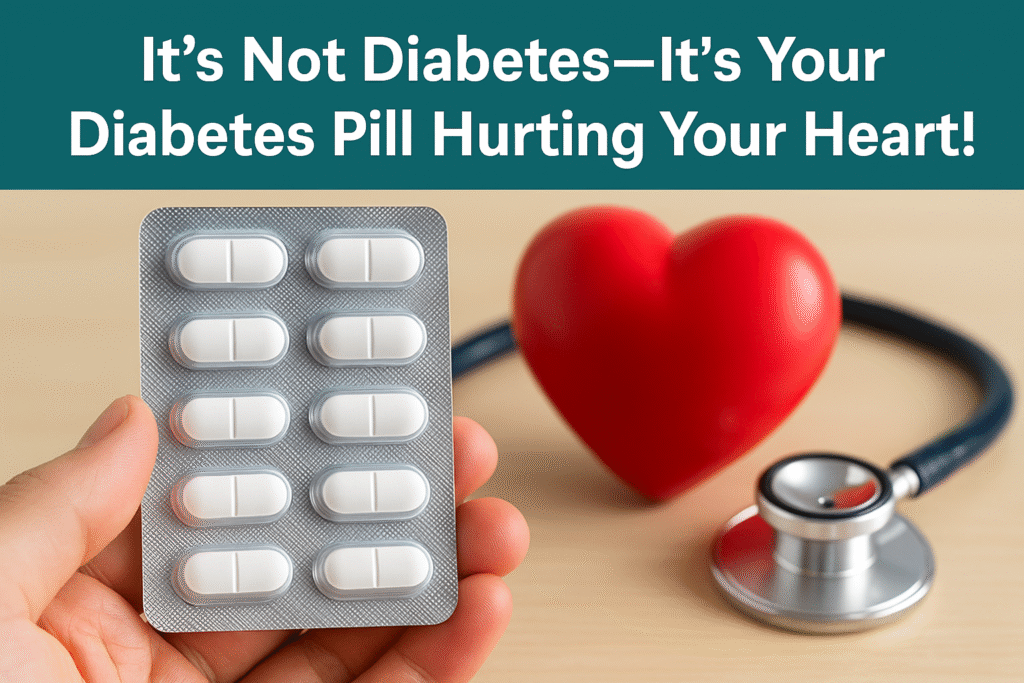A major new study reveals a link between glipizide, a common type 2 diabetes pill, and increased heart disease risk. Learn how to protect yourself and explore safer options.
A Wake-Up Call from the Heart of Diabetes Treatment
If you or someone close to you has type 2 diabetes, chances are glipizide sounds familiar. For decades, it’s been one of the most trusted weapons in the fight against blood sugar. Affordable, effective, and widely prescribed—especially when metformin alone isn’t enough. But here’s a twist nobody saw coming: what if the very pill meant to control your diabetes was quietly increasing your risk of heart disease?
A new bombshell study has revealed just that. And it’s not just some fringe theory—it involved nearly 48,000 people and brought to light something that could change the way diabetes is treated around the world.
Let’s dive into this groundbreaking revelation and understand why this isn’t just about one medicine—but about the silent trade-offs we make in chronic disease care.
Glipizide: The Friendly Pill Now Under Fire
Glipizide belongs to the sulfonylurea class of drugs. Doctors have relied on it for decades to help patients lower their blood glucose levels. Compared to newer options, it’s cheaper and has a longer track record.
But that long history doesn’t mean it’s without baggage.
In this new research, glipizide users were 13% more likely to suffer from major heart events—like heart attacks, strokes, or heart-related hospitalisations—than those using a newer drug class known as DPP-4 inhibitors.
Here’s the scary part: The people in the study weren’t even high-risk heart patients. They were your everyday folks managing diabetes—people like your uncle, your neighbor, or maybe even you.
Let’s break it down even more…
The Numbers Tell a Story You Can’t Ignore
The study revealed:
- 9.1% of people on glipizide experienced heart-related events within five years.
- 8.1% of people on DPP-4 inhibitors had the same outcome.
- Risk with glimepiride and glyburide (other sulfonylureas) was also slightly higher than DPP-4 inhibitors but not as alarming.
So why the fuss over 1%?
Because every per cent matters when you’re talking about the heart—especially if you’re already living with a condition that puts it under daily stress.
A Real-Life Scenario That Hits Home
Let’s talk about Ramesh, a 55-year-old school teacher from Lucknow.
He was diagnosed with type 2 diabetes at 48. Metformin worked for a while, but as his sugar levels climbed, his doctor added glipizide. It was effective, affordable, and seemed harmless. Life went on. Until two years later, Ramesh had a mild stroke.
The doctors didn’t link it to the medication at first. He didn’t have high blood pressure or a major family history. But during a hospital discussion, his daughter, a young medical student, asked the neurologist, “Could it be the glipizide?”
The doctor paused.
That was two years ago. Today, this new study gives her question frightening weight.
Why Cheaper Isn’t Always Better
It’s understandable—sulfonylureas like glipizide are widely used in low- and middle-income countries because they’re cheap. DPP-4 inhibitors and other modern drugs come with a higher price tag. But here’s the thing:
What good is affordable medicine if it slowly increases the risk of a heart attack?
Healthcare isn’t just about cost—it’s about value, longevity, and quality of life.
This study forces us to rethink what “cost-effective” really means.
But Should You Stop Taking Glipizide Immediately?
Absolutely not. That’s not what the study or this blog is saying.
This isn’t a panic button—it’s a conversation starter.
Here’s what you SHOULD do:
- Talk to your doctor: Ask about your specific heart risk and if glipizide is still the right fit for you.
- Review your health history : Especially if you have a family history of cardiovascular issues.
- Stay informed: Don’t shy away from medical research—ask questions and demand clear answers.
- Explore alternatives: DPP-4 inhibitors, SGLT2 inhibitors, and GLP-1 receptor agonists are newer options with heart-protective benefits.
Remember, personalized care is the future of medicine.
Why This Study Matters for Every Diabetic Family
Whether you’re taking medication, supporting a parent, or helping your spouse manage diabetes, this study changes the way we need to think about treatment.
Here’s what it teaches us:
- Not all diabetes pills are equal—even if they seem effective.
- Heart health must be part of the diabetes discussion—not an afterthought.
- Long-term safety matters—especially in chronic illnesses where treatment goes on for decades.
Final Thoughts: Empowerment Through Awareness
We’re not here to scare anyone. We’re here to say: you deserve to know everything about the medicine you put into your body.
You wouldn’t drive a car without airbags, right? Then why take a pill that could raise your heart risks without knowing your options?
We now have tools, technology, and research to make informed, balanced, and personalized decisions. Let’s use them.
Your Health, Your Right
So, the next time you’re at the clinic and the doctor reaches for that prescription pad, don’t just nod. Ask:
- “What does this do for my heart?”
- “Are there safer alternatives?”
- “Can I get a second opinion?”
Because sometimes, the pill we think is saving us could be quietly stealing something precious.
Stay curious. Stay informed. Stay healthy.
Disclaimer: This article is meant for educational purposes only. It does not replace professional medical advice. Always consult your healthcare provider before making changes to your treatment.
Please don’t forget to leave a review.

